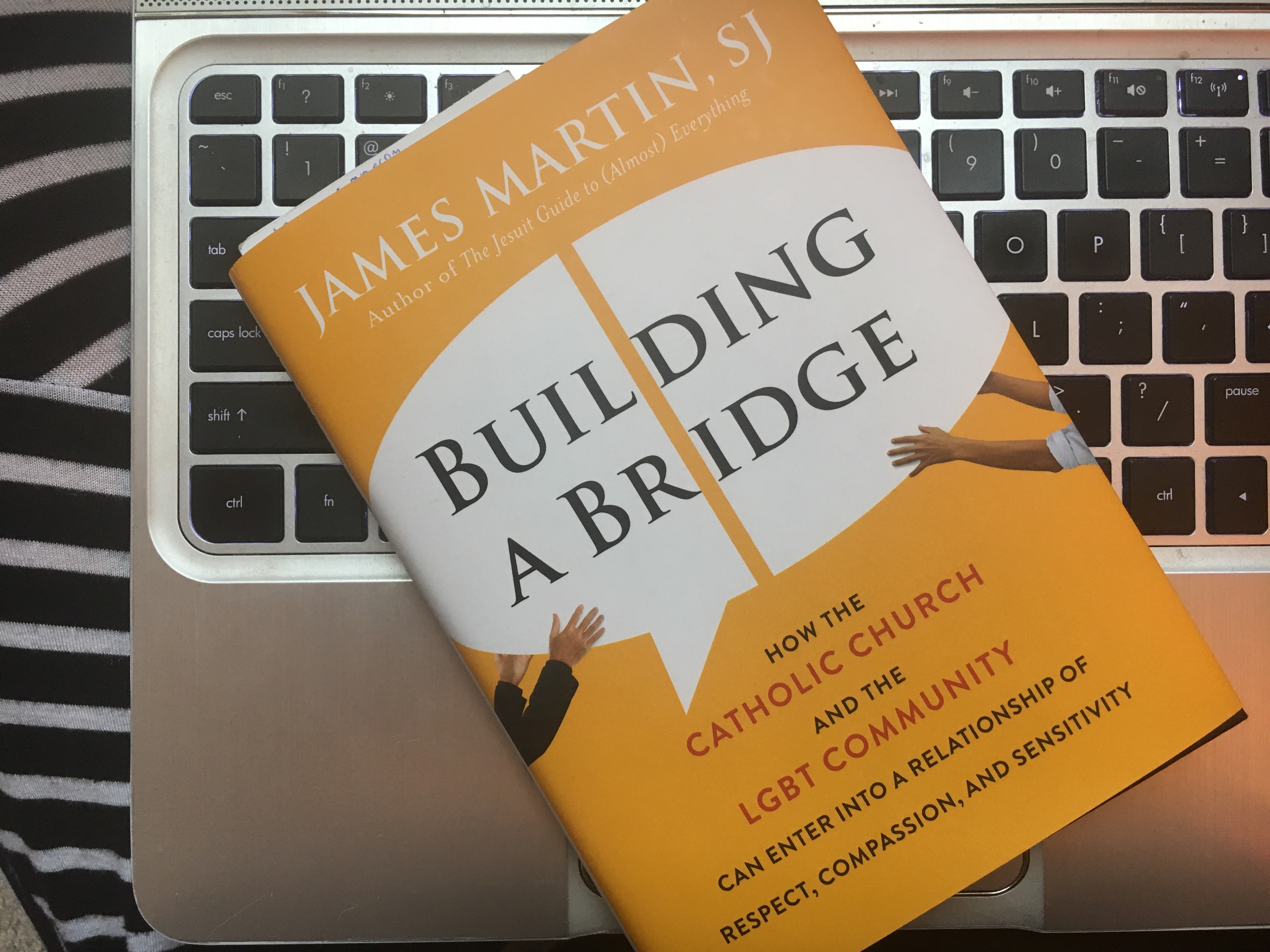After I shoe shopped yesterday, I stopped at the mall’s Barnes & Noble to do what I always do: browse the Christian books. This time I bought one — Building a Bridge by Fr. James Martin.
And I’d been warned. Catholic Twitter had sounded the alarm, had said to read reviews of it instead, to steer clear of it (and, in fact, to steer clear of Fr. Martin himself, who, by the way, I met once and is quite cordial).
Now that I’ve read it (excluding its second half, which is for meditation and reflection — I’ll read that later), I’d like to invite Catholic Twitter to do a new thing: cool your dang jets.
The book’s first half is an expanded version of a speech that Fr. Martin delivered at an awards ceremony hosted by a ministry that ministers to the LGBT community. It points out the Catholic catechism’s call for all Catholics to treat people who are LGBT with “respect, compassion, and sensitivity.”
Fr. Martin suggests that doing so can bridge the gap between practicing Catholics and a lot of people who’ve been alienated by them. But the Catholics who warned me not to read it warned me because of what isn’t in it, such as exactly what the Church teaches about homosexuality.
In her review of Building a Bridge, Janet Smith calls the absence of that an “egregious flaw.” She also calls out Fr. Martin for not acknowledging a handful of ministries that long have worked to build bridges between the Church and the LGBT community.
It is as a Roman Catholic, a chastity speaker, and an author that I say this: I don’t think that’s a problem.
Fr. Martin’s publisher is a Harper Collins imprint. Which means Fr. Martin had an editor. Which means that if he missed the mark regarding the book’s intended purpose, the editor would have caught it and sent it back for revisions.
It is true that he — a Jesuit priest who himself has vowed to live a perpetually chaste life — didn’t explicitly state that the Church asks gay people to live chastely, too. It is also true that he didn’t mention ministries like Courage, Encourage or Living Waters.
Consider: the reason these things and any other things that didn’t show up in the book did not, in fact, show up in the book is because the book isn’t a book about those things. Accept it.
But the Catholics who warned me not to read it were disappointed, too, by some of what did show up in it.
Fr. Martin requests that out of respect, we refer to gay people as the LGBT community (and not as same-sex-attracted or homosexuals, for example) if “the LGBT community” is what the community would like to be called. I don’t disagree.
He also suggests that a lot of people are fired from church jobs for being gay — but not, say, for using contraception or heterosexually cohabitating. Is that accurate? No idea. But if it’s what he’s actually observed, he reserves the right to put it in a book that he wrote.
This is frankly stuff that doesn’t rile me up. If that disappoints you, I don’t know what to tell ya. But I can tell you what does grate on me: how people on the Internet have handled this.
By bullying Fr. Martin. By calling the book flawed because it’s not the book they wish it was. By acting like they’ll be ready to have friendships with people who are LGBT after they’ve aligned their choices with Church teaching.
Which is like saying “we’ll accompany you when — independent of our love — you discover that the Church has what you need; we, the body of Christ, will welcome you after you’ve had a conversion experience.”
Which is why in the book Fr. Martin reminds us of Jesus’s response to Zacchaeus, the chief tax collector “and therefore … the chief sinner.”
…he doesn’t point to him and shout, “Sinner!” Instead, Jesus says that he will dine at Zacchaeus’s house, a public sign of openness and welcome, before Zacchaeus has said or done anything. Only after Jesus offers him welcome is Zacchaeus moved to conversion…
And I think Fr. Martin is right when he implies: we’re a lot more likely to see conversion when our respect, compassion, and sensitivity are authentic and unconditional.

